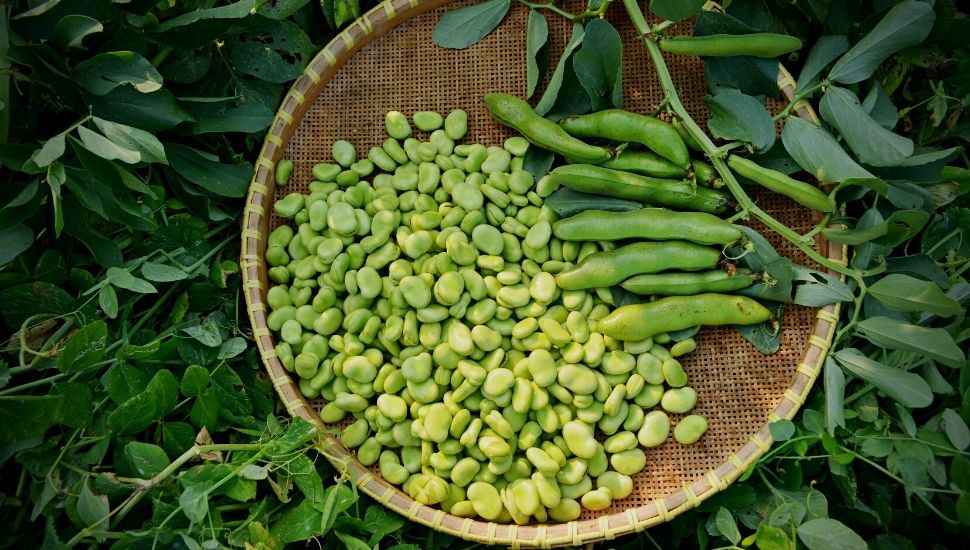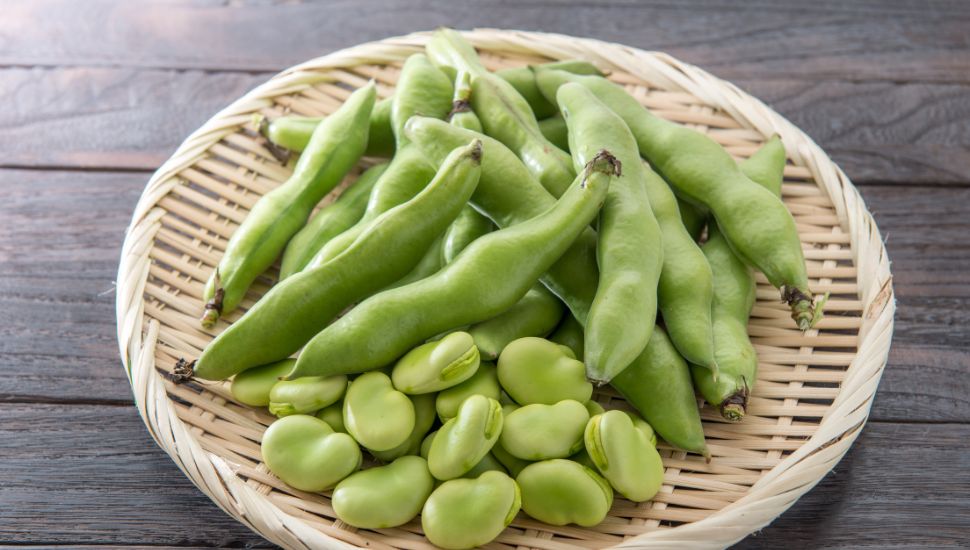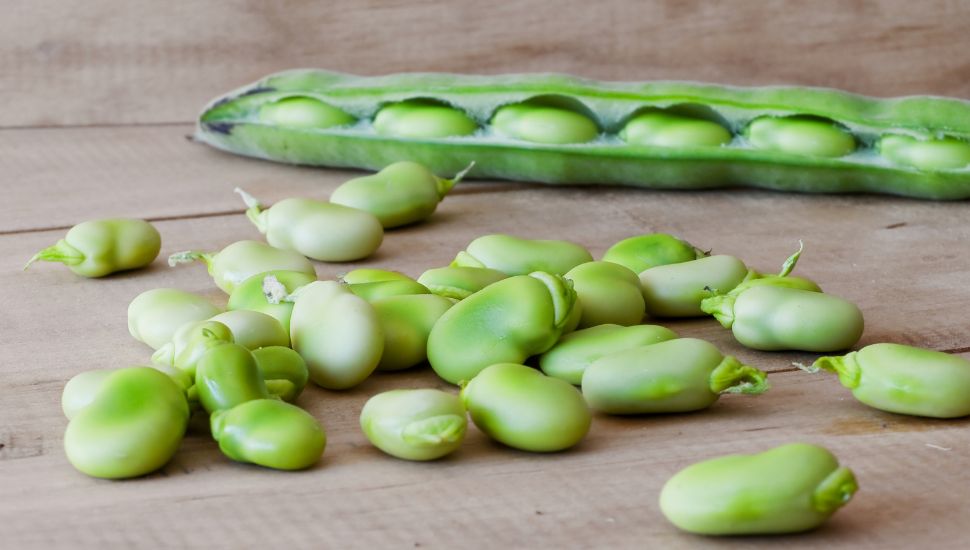
The tasty little broad beans are unavailable throughout the year, which is sad because they taste so good that they are not available all the time.
Apart from this, they also require hard work to remove the beans from the pods. Therefore, we all want a way to ensure a year-long supply of these beans or want to get ahead of ourselves and save the beans after shelling them for long durations.
But, the big question is, how can you save them? You can do it by freezing them in your freezer.
When summer and spring arrive, the season of eating beans gets in full swing. From being perfect for salads to making soup or simply roasting those in salt and pepper, broad beans taste heavenly in any form.
These beans are a sign of happy summer days. But like all good things end, these beans’ season is short-lived. But, we have a secret with which you can enjoy these beans all year long.
Broad beans can be eaten as a whole (pods + beans), but we usually take the beans out of the pod for better and yummier-tasting beans. Broad beans are a product of the hot months, which is why they are rarely available during winter.
However, since they taste so creamy and delicious, we all want a foolproof way to store them for making soup in winter.
Can You Freeze Broad Beans?
You can easily freeze broad beans for more than six months. But, to freeze them, you have to take care of a few things, like blanching them beforehand or taking them out of their pods so that they don’t become mushy when you try to do it after defrosting.
In addition, you want to ensure that your broad beans retain their fresh color, texture, and flavor.
So, read on if you want to know how to do that!
How To Freeze Broad Beans?
There are two ways you can freeze broad beans. You can freeze them directly after shelling, or you can blanch them, so they are ready to eat, and you can directly add them to your dish.
So, let’s get into the details of how you can freeze the beans directly after shelling them.
Freezing fresh broad beans
If you want to keep the beans as it is, then the easiest way to do it is by removing the shell of your beans and then freezing them. Here is how you can do it.
- Take bean pods and then remove the shell to take out the beans in a big bowl. But, ensure that you remove all the husk and pieces of shell from the beans.
- After you have removed all the shells, wash the beans thoroughly and then put them in a kitchen basket to dry,
- Once completely dry, put the beans into a freezing bag, seal it and then put it in the freezer to freeze.
- You can freeze them for 6-7 months.
Freezing broad beans after blanching
This method of blanching the beans is very popular because it retains all the beans’ good properties and nutrients while frozen. Here is how you can do it.
- Once you remove the beans from the pods and put them in a bowl, all you need to do is put them in a pan with water and boil them for a few minutes until the color dulls a bit.
- Once blanched, strain the beans and let them cool.
- You can freeze them for 7-8 months in a fresh state.
If you freeze your broad beans without blanching, they will retain their fresh color and crunchiness until they are thawed.
But, if you blanch them, then you can directly add them to your dish because they are already cooked and also have goodness preserved in them.
Pros and Cons of Freezing Broad Beans
Now, if you are thinking about whether freezing broad beans is a good idea, then I will talk about some pros and cons of this practice. But, if you ask me, I would tell you that it is completely safe to freeze broad beans.
Pros:
Once you decide to freeze broad beans, you won’t want to go back because they are not only super convenient, but they are also good when frozen.
Once frozen, they keep their goodness stored inside them until thawed. It doesn’t matter if the beans are frozen after boiling or not because if not boiled, you can use them directly in the dishes that require raw broad beans. And if you boil them, then you can use them directly in soups and other dishes.
Another advantage of freezing broad beans is that you can enjoy these creamy beans even after their season is gone.
So, it’s a win-win situation for you if you are willing to do some hard work by shelling, boiling (or not), and freezing them.
Cons:
Do you know that there are no cons to freezing broad beans? Other than enzymes hardening the beans even while they are frozen, but blanching can halt those enzymes in the plant.
Remember that blanching doesn’t mean cooking the beans. It is simply a preparatory method for freezing beans.
What can go wrong with freezing beans? Absolutely nothing. So, enjoy its advantages!
How Long Can You Freeze Broad Beans?
Your broad beans (blanched or not) are supposed to stay good in the freezer for up to 12 months once they are properly frozen.
But, the duration of how long your beans will last depends on the method you froze them with. Un-blanched beans last a little less long (8-10 months) than blanched beans (12 months).

They can last longer, but I don’t think anyone will keep such delicious beans stored for a long time, right? Freezing the beans for 12 months or more means another season of broad beans will come and go.
So, try to use the beans before the next season starts because you can always freeze a new batch every season.
Related articles:
- Can you freeze wild garlic?
- Can you freeze chorizo?
- How to freeze runner beans?
- Can you freeze halloumi?
How Do You Defrost Broad Beans?
There are a couple of ways in which you can defrost your beans.
The first way is the one with which you can keep the maximum goodness and nutrients of the beans in them. You can put the pack of beans in the fridge overnight and let them thaw at a slow pace.
If you want to use them the next day, then put them in the fridge a day before, and when you want to use them, they will be thawed.
However, sometimes you want to quickly thaw the beans to make your soup for the guests. In such situations, you can use the second method, which is of placing the pack of beans in a bowl of water.
The beans will thaw in a matter of minutes, and you can use them however you want. Or you can also leave them on the kitchen counter to thaw, which will take more or less 30 minutes.
Can You Refreeze Broad Beans?
You can easily refreeze broad beans after thawing them. But, before you refreeze them, I suggest you completely defrost them and then freeze them again.
The only drawback of refreezing the beans is that they will lose the texture, nutrition, and freshness they had when frozen for the first time.

If you want to refreeze your beans, then don’t defrost them at room temperature because that can expose your beans to bacteria. Instead, the best option is to thaw them in the fridge to stay cold before refreezing.
Or better yet, take out only enough beans from the freezer that you want to use. This way, you won’t have to defrost or refreeze them.
Do Broad Beans Freeze Well?
Broad beans freeze extremely well, just like frozen peas. However, if you want to freeze a healthier version of the beans, you should blanch them, bring them to room temperature and then put them in freezer bags in small portions (the quantity you know will be used at once).
After freezing the beans, you can use them for as long as you want (around 12 months); you can use them for more than 12 months, but it is a good idea to use them within this period.
One thing I strongly recommend about freezing beans is that you take out some time to remove the skin and pods of the beans before freezing them. Because doing this will allow you to simply put the beans in the pot without any prior preparation.
Final Verdict
Broad beans are perfect for reminding you of the spring season by making your dishes taste creamy and fresh. But unfortunately, it has a specific season, and when that season ends, the only way to enjoy the beans is by freeing them and storing them for later.
So, if you too want to enjoy the beans for many months, you can use our guide to save and store beans in the freezer for up to 12 months or more.
Frequently Asked Questions
Can you freeze broad beans without blanching them?
Yes, you can freeze your broad beans without blanching them because freezing depends on your personal preference.
However, if you don’t blanch them, the bean-growing enzymes can harden the beans and make them overripe when they are frozen.
If you don’t want to eat hard beans, then I suggest you blanch them for a few seconds to retain the freshness and to keep them from becoming hard.
How do you blanch and freeze broad beans?
Blanching the beans is very easy. All you have to do is get your desired amount of beans, shell them and remove their skin.
Once all this is done, boil water in a pan and blanch the beans in it for 30 seconds to 1 minute. Ideally, to blanch, you should put the beans in boiling water and let it get once boil before draining the water.
After blanching, drain all the water and let the beans cool. Once they are at room temperature, you can make portions of beans in a freezing bag and put them in the freezer.
Do you have to cook broad beans before freezing?
You don’t have to cook the beans before freezing, but if you want to do it, you can do it depending on your preference.
If you think that blanching is cooking, then it is not cooking. It is simply a method to prepare for freezing the beans and stopping the enzymes from over-ripening the beans.
Can you freeze broad beans uncooked?
Yes, you can freeze them without cooking. You should freeze them so that you may get a chance to use them in anything you want.
Freezing them after cooking will only increase your labor. If you think blanching is cooking, then it is not. Blanching is just a method to keep the beans fresh for longer.
References:









